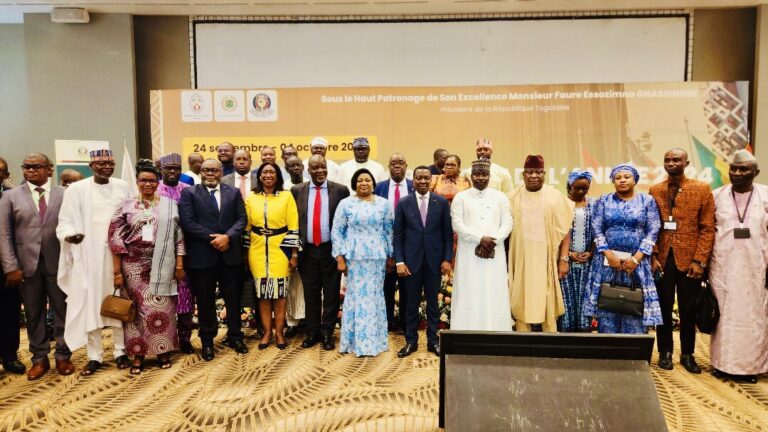- Safiu Kehinde
The ECOWAS Parliament has made call for speedy reforms to transform the subregional bloc’s operations to tackle prevailing multifaceted challenges.
The Speaker of the Parliament Memounatou Ibrahima stated this at the opening ceremony of the 2024 Third Extra-Ordinary Session and Second Parliamentary Seminar of the parliament in Lome, Togo on Tuesday.
Highlighting the socio-political crisis rocking West Africa, Ibrahima noted that the making of budgetary provisions for adequate funding of the efforts toward addressing the subregion’s multiple challenges was a priority focus of the session.
“Our region is ravaged by floods, terrorism, violent extremism and irregular migration that have affected thousands of our citizens.
“ECOWAS of 50 years must speed up reforms to consolidate the principles of democracy and good governance to drive the vision of the founding fathers,” she said.
Ibrahima also lauded Togolese President Faure Gnassingbe for his ceaseless support to regional integration and women empowerment.
According to the her, her emergence as the first female speaker of the ECOWAS Parliament is proof of Eyadema’s commitment and zeal to promote female competences at all levels.
Ibrahima said the event was to enable the parliament to consider and adopt its 2025-2027 budget for a financial roadmap of “pragmatic measures,” to address ECOWAS’s challenges of peace, stability, solidarity and progress.
She said that the session would also examine the level of implementation of Parliament’s 2023 budget, as well as the mid-term budget for the 2024 financial year, to ensure that it aligned with the region’s development goals.
She said that ECOWAS Female Parliamentarians Association (ECOFEPA) would also hold a symposium tagged: “Empowering Women Through Financial Inclusion,” aimed at empowering women economically by unlocking opportunities through financial services.
Also speaking, President, ECOWAS Bank for Investment and Development (EBID), Dr George Donkor, said it was imperative to strengthen infrastructure and investment priorities in West Africa to unlock its vast opportunities.
According to him, this will make the economies of ECOWAS member states more competitive, stressing that equitable distribution of economic opportunities for all citizens is equally crucial.
Represented by MacDonald Goanue, the Director, Department of Research and Strategic Planning, Donkor said the ECOWAS Parliament was a vital institution to facilitate dialogue, promote peace and stability towards achieving ECOWAS’ objectives.
The EBID President emphasized the need for ECOWAS institutions to prioritize regional cooperation to boost investments and ensure equitable distribution of the benefits.
“West Africa must ensure that the benefits of investments are equitably distributed among its citizens and together we can realize the vision of the bloc for its citizens,” Donkor added.
Togo’s Minister of Human Rights, Citizenship Training and Relations with the Institutions of the Republic of Togo, Pacome Adjourouvi, decried the human rights situation in the ECOWAS subregion.
According to him, human rights have been undermined by repressive governments, which suppressed freedom of speech and protests against harsh government policies.
“Human rights protection will guarantee peace and greater opportunities for the citizens to thrive.
“We must play an essential role to promote and protect human rights in West Africa.
“The implementation of the African Charter on Human and Peoples’ Right and gender equality will bring the regional bloc near to its cherished objectives,” he said.
Declaring the session opened, Togo’s National Assembly Speaker, Sevon-Tepe Adedze, said ECOWAS must intensify its developmental strides with budgetary provisions for a better Community.
“The ECOWAS Vision 2050 must consider social inclusion, economic integration, peace, stability, harmony and prosperity as espoused by the President of Togo, Faure Gnassingbe,” the speaker said.
The News Agency of Nigeria (NAN) reports that ECOWAS will mark its 50th anniversary in May, 2025 following its formation on May 28, 1975, to promote subregional economic cooperation and development to raise citizens’ living standards.
ECOWAS is currently facing a myriad of economic and security challenges, including irregular migration of its youths in search of greener pastures in Europe and the Americas, violent extremism and terrorism.


